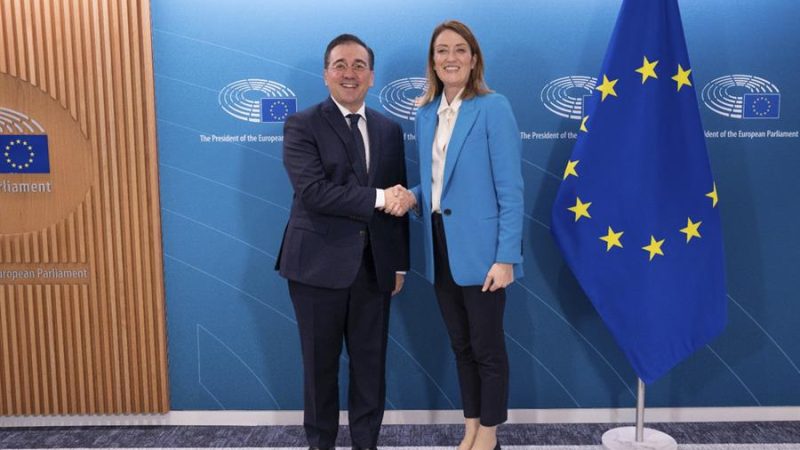
Brussels – On Wednesday, Spanish Foreign Minister José Manuel Albares informed the President of the European Parliament, Roberta Metsola, that co-official languages are integral to “Spanish identity,” as they await an internal report assessing the implications of their use during parliamentary sessions.
In comments to the media following his meeting with Metsola at the European Parliament in Brussels, Albares emphasized that this matter transcends partisan politics and instead pertains to Spanish national identity.
This meeting, which was originally set for early November but delayed due to severe weather, follows Metsola’s request for a new report analyzing the impact of using Catalan, Basque, and Galician in parliamentary discussions. This report will serve as an initial step toward potentially incorporating these languages more formally into the European Parliament’s linguistic framework.
The Bureau’s working group focused on languages, citizens, and interpretation will convene for the first time in this legislative term on December 10 to draft a report detailing the practical, budgetary, and political ramifications of this decision, although there is no specific timeline for its completion.
Albares acknowledged that while the report falls under the jurisdiction of the European Parliament, the topic is already being addressed and will follow a standard process. The group includes two Spanish vice-presidents of the European Parliament, socialist Javi López and popular party member Esteban González Pons. Albares expressed his belief that this issue should not be politicized, framing it instead as a matter of national identity, and conveyed this sentiment to the Popular Party.
He stated, “This is not about one group of Spaniards triumphing over another; it encompasses our national identity, which is reflected in the co-official languages recognized by our Constitution and commonly spoken in many autonomous communities, including by members of the Popular Party. I genuinely do not want to turn our official languages into a divisive issue; I aim to foster unity among all political factions.”
During the meeting, Albares did not discuss the initial report requested by Metsola from the European Parliament’s legal services in 2022, details of which have not been disclosed. This report is believed to cover issues such as interpreter costs, potential political consequences if other EU countries with linguistic minorities seek similar recognition, and the case of Gaelic, which was the last language to gain official status at the EU level.
This development follows Albares’ third letter to Metsola in September, advocating for the recognition of the three co-official languages and underscoring their significance within Spanish national identity and its foundational political and constitutional structures.
Nonetheless, the proceedings in the European Parliament are separate from the Spanish government’s push for these languages to gain official status throughout the European Union, a discussion currently ongoing within the Council of the European Union. This issue was a priority during Spain’s presidency of the Council but remains unresolved.
Albares mentioned that he has not spoken specifically with the Polish Government, which will hold the rotating presidency of the Council in the first half of 2025, regarding the timing of discussions on this matter. However, he is optimistic that Spain’s proposal will be included in the Polish Presidency’s agenda without significant obstacles.
During their encounter, the minister also took the opportunity to discuss the new European legislative term with Metsola, congratulating her on her re-election as President of the European Parliament and thanking her for her efforts on behalf of storm victims, particularly in advocating for an expedited regulatory framework to facilitate certain aid measures. (November 4)













Leave a Reply